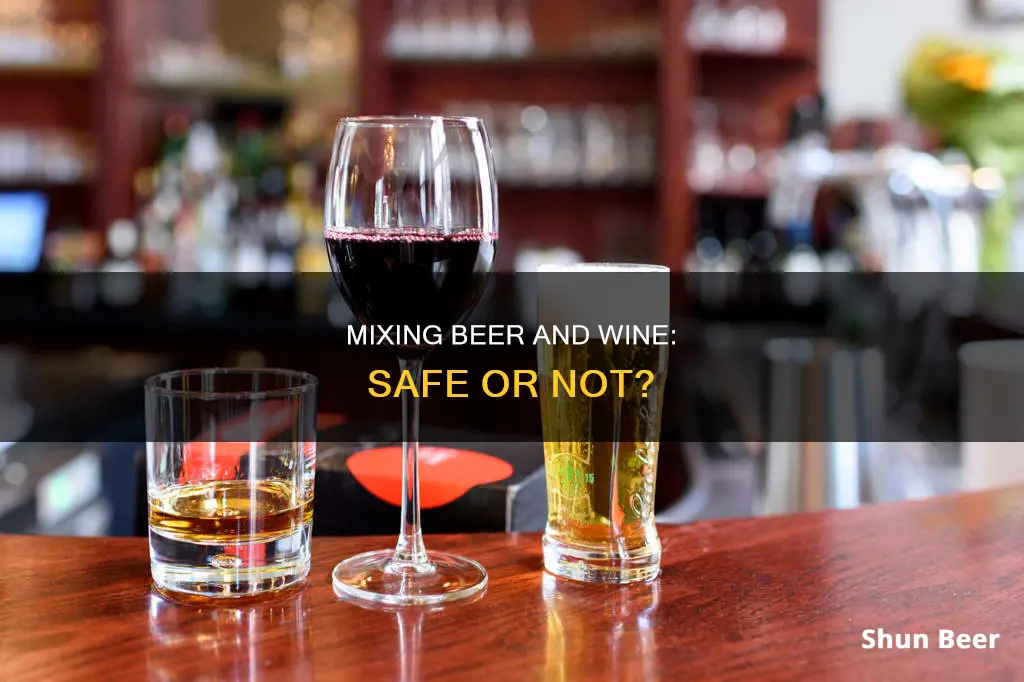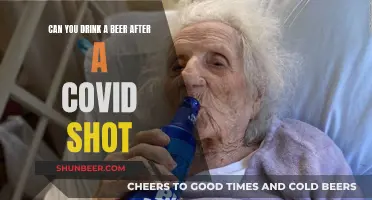
There is a long-standing belief that drinking beer after wine can worsen hangovers. This idea is encapsulated in the sayings, beer before wine and you'll feel fine; wine before beer and you'll feel queer and beer after wine and you'll feel fine; wine after beer and you'll feel queer. However, recent studies have debunked this myth, finding that the order of drinking beer and wine does not impact the severity of hangovers. Researchers from Witten/Herdecke University in Germany and the University of Cambridge in the UK conducted a study with 90 participants, who drank beer and wine in different orders, and found no significant differences in hangover intensity between the groups. The findings suggest that it is the amount of alcohol consumed, rather than the order, that influences the severity of hangover symptoms.
| Characteristics | Values |
|---|---|
| Beer before wine, will I be fine? | Drinking beer before wine will not prevent a hangover. |
| Wine before beer, should I fear? | Drinking wine before beer will not make your hangover worse. |
| Beer after wine, will I be fine? | Drinking beer after wine will not make your hangover worse. |
| Wine after beer, should I fear? | Drinking wine after beer will not prevent a hangover. |
| Beer before wine vs wine before beer | There is no correlation between hangover symptoms and the order in which you drink beer and wine. |
| Hangover predictors | The best predictors of a bad hangover are how drunk you felt and whether you vomited after drinking. |
What You'll Learn

Beer before wine, you'll be fine
There is a well-known saying that goes, "beer before wine and you'll feel fine." This is often heard in drinking establishments, and similar variations exist in French and German. The idea is that drinking beer before wine will result in a milder hangover than the other way around. However, this concept has been debunked by recent studies.
The order of alcoholic drinks consumed does not affect the severity of a hangover. Researchers from Witten/Herdecke University in Germany and the University of Cambridge conducted a study on 90 German students between the ages of 19 and 40, dividing them into three groups with different drink orders. The participants' hangover symptoms were assessed using a questionnaire and overnight monitoring, but no significant differences were found between the groups. The study concluded that drinking too much alcohol, regardless of type or order, will result in feeling unwell the next day.
The commonly held belief that beer before wine will prevent a hangover is a myth. The best predictors of a bad hangover are how drunk an individual feels and whether they vomit after drinking. It is important to pay attention to these red flags and drink responsibly, never driving under the influence, and knowing one's limits.
So, the saying "beer before wine, you'll be fine" may not hold much scientific weight. However, it is always essential to drink in moderation, stay safe, and be mindful of one's well-being.
Vaccinated and Thirsty: Beer and COVID Vaccine Timing
You may want to see also

Wine before beer, you shouldn't fear
There is a popular saying that goes, "Beer before wine and you'll feel fine; wine before beer and you'll feel queer". This implies that drinking wine before beer will make you feel worse for wear. However, this is just a myth.
A study published in the American Journal of Clinical Nutrition examined whether the order of drinks influenced the severity of hangovers. The study involved 90 participants between the ages of 19 and 40, who were divided into three groups. The first group drank beer followed by wine, the second group drank wine and then beer, and the third group only drank one type of alcohol. The participants were monitored throughout the experiment and asked to rate their level of drunkenness and hangover intensity.
The results showed that the order of drinks had no significant impact on hangover severity. Both women and men experienced worse hangovers the drunker they felt and if they vomited. So, it's not the order of drinks that matters, but rather how drunk you get and whether you throw up.
So, the next time you're out for drinks, remember that it's not so much the order of drinks that matters, but rather your overall alcohol consumption and how your body responds to it. Listen to your body and drink responsibly!
Liver Biopsy: Drinking Beer, Safe or Not?
You may want to see also

Hangover intensity
A study published in the American Journal of Clinical Nutrition examined the effects of drinking beer before wine or wine before beer on hangover severity. The study found no significant difference in hangover intensity between the two groups, indicating that the order of drinking beer and wine does not necessarily influence the severity of a hangover. However, it is important to note that individual factors, such as gender, body size, drinking habits, and frequency of hangovers, can also play a role in hangover intensity.
The intensity of a hangover is primarily determined by the amount of alcohol consumed and individual factors. According to the National Institute on Alcohol Abuse and Alcoholism, the more alcohol a person drinks, the more likely they are to experience a hangover. Additionally, certain types of alcohol, such as darker spirits or red wine, which contain higher levels of congeners, may contribute to more intense hangovers. Congeners are chemical byproducts of the fermentation process, and while they add flavour and aroma to drinks, they also prolong the presence of alcohol and its byproducts in the body.
To mitigate the intensity of a hangover, it is advisable to drink responsibly and in moderation. Staying hydrated by drinking water, eating before and while drinking, and pacing yourself can help reduce the severity of a hangover. Additionally, avoiding drinking on an empty stomach and ensuring proper hydration can also lessen the negative effects of a hangover.
Alcohol-Free Beer and Metronidazole: Is It Safe?
You may want to see also

Alcohol absorption
Alcohol is a toxin that must be eliminated from the body. About 10% of alcohol is eliminated through sweat, breath, and urine, while the liver metabolises the rest. The liver metabolises alcohol at a constant rate of about one drink per hour. The liver cannot speed up this detoxification process, so when there is excessive alcohol in the blood, the unmetabolised alcohol continues to circulate in the bloodstream, leading to intoxication.
The rate of alcohol absorption depends on several factors. Alcohol is absorbed quickest when consumed on an empty stomach and when the alcohol concentration is 20-30%. For example, sherry, with an alcohol concentration of about 20%, increases blood alcohol levels more rapidly than beer (3-8%). Carbonated alcoholic drinks also increase the rate of alcohol absorption. This is because the pressure inside the stomach and small intestine forces alcohol to be absorbed more quickly into the bloodstream.
Food in the stomach can inhibit the absorption of alcohol. Firstly, it physically obstructs the alcohol from coming into contact with the stomach lining. Secondly, food in the stomach will prevent alcohol from passing into the duodenum, which is the upper portion of the small intestine. The surface area of the small intestine is very large, so alcohol has more access to enter the bloodstream once it leaves the stomach. If alcohol is sequestered in the stomach, it will be absorbed more slowly. Greasy, high-protein, and fatty foods are best for slowing intoxication because they are more difficult to digest and stay in the stomach longer.
The full effects of a drink are typically felt within 15 to 45 minutes, depending on the speed of absorption. Alcohol affects each person differently and can even affect the same person differently on different occasions. Factors that influence how quickly a person becomes intoxicated include gender, mood, food in the stomach, the amount and speed of alcohol consumption, tolerance to alcohol, physical condition, medication or drug use, carbonation, and altitude.
Drinking Beer on Daytona Beach: What's Allowed?
You may want to see also

Drinking culture
Drinking alcohol is often associated with socialising and is considered a social lubricant. In many cultures, good news is celebrated by sharing alcoholic drinks, such as toasting the bride at a wedding or celebrating the birth of a baby. Buying someone an alcoholic drink is often seen as a gesture of goodwill or an expression of gratitude. Social drinking refers to the casual consumption of alcoholic beverages in a social setting without the intention of getting intoxicated.
However, excessive drinking or binge drinking can have negative consequences and is linked to various health risks, including alcoholism, blackouts, and even sudden death associated with strokes. Binge drinking is defined as drinking to excess, bringing blood alcohol concentration to 0.08 grams per cent or above. This corresponds to consuming five or more drinks (for men) or four or more drinks (for women) in about two hours.
Alcohol advertising and marketing have been found to influence social norms and contribute to increased alcohol consumption, especially among adolescents and young adults. Studies have shown that exposure to alcohol advertisements can lead to a higher number of drinks consumed, the development of alcohol brand preferences, and increased alcohol consumption over time.
The United Kingdom, known for its pub culture, ranks 24th in the world for per capita alcohol consumption. Finland has one of the most significant drinking cultures in Europe, with alcohol consumption mostly occurring during the weekends. Germany also has a prevalent drinking culture, with Germans consuming an average of 28 gallons of beer per capita annually.
While moderate alcohol consumption is often associated with potential health benefits, such as a reduced risk of heart disease, it is crucial to balance these perspectives with the understanding that excessive drinking can lead to negative health consequences and social issues.
Chilling Beer Fast: How Do Chiller Sticks Work?
You may want to see also
Frequently asked questions
Yes, you can drink beer after white wine. However, drinking too much alcohol, regardless of the order, is likely to result in a hangover.
Some popular sayings include: "Beer before wine and you'll feel fine; wine before beer and you'll feel queer", "Beer before wine not so fine; wine before beer, never fear", and "Beer after wine and you'll feel fine; wine after beer and you'll feel queer".
According to a study by researchers at Witten/Herdecke University in Germany and the University of Cambridge in the UK, the order of drinking beer and wine does not affect the intensity of a hangover. The amount of alcohol consumed and individual factors such as perceived drunkenness and vomiting are better predictors of a hangover.







